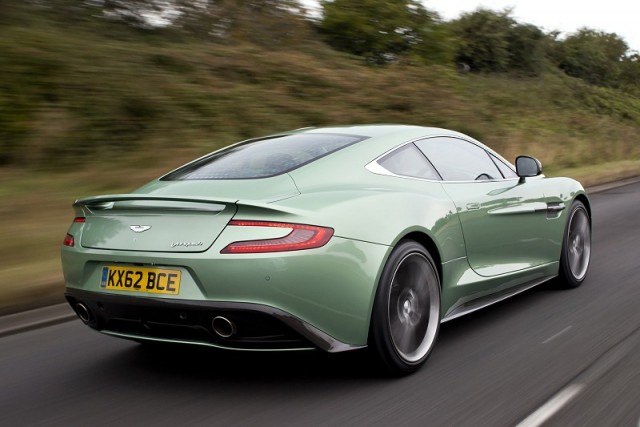Overall rating: 4.5/5
Aston Martin has revived the Vanquish tag for its new main-line range-topper, taking over where the charismatic DBS left off, but with added bite. It's essentially better in every way - if a touch expensive. However, it justifies that to a certain extent by how special it feels.
In the metal 5/5
Marek Reichman, Aston's Design Director, says that the Vanquish is the "best piece of design" he and his team have ever done (he would though, wouldn't he?), but it raises a smile from the gathered journalists when he tells us "don't just drive your cars, feel them". The Vanquish has been criticised by many for being far too evolutionary - and it is that, but by the same token, it's nothing short of spectacular to behold - wide, squat, purposeful and very special. There are too many fine details to go into here, but if you get a chance to go near one, take a close look at the one-piece carbon boot lid and spoiler and how the Aston badge's shape is echoed in that and the LED rear lights. Exposed carbon fibre elsewhere reminds you that all external body panels are made of the stuff as well.
If you wish you can specify it for the interior too, though to be honest it doesn't need it really, as it's special enough - and more spacious than before too. Sumptuous leather covers supportive seats up front (and laughably small ones in the back if you go for the 2+2 option), while Aston offers a seemingly endless palette of colour choices - including a distinctive double stitching detail throughout. More unusual again is the 'square' steering wheel from the One-77, which somehow works.
Driving it 4.5/5
Though the Vanquish's V12 engine shares its layout and 6.0-litre capacity with the DBS, it has come in for considerable change in a bid to enhance both performance and efficiency. Buyers will be more interested in the former, where peak power is now 573hp, backed up by 620Nm of torque. Though these figures are produced at relatively high revs there are no flat spots in this engine's delivery and despite the 1,739kg mass, response and acceleration is instant even from low revs.
A 0-100km/h time of 4.1 seconds is quick in any book and the Vanquish will top out at 295km/h, but it's certainly not purely a dragster (despite the prominent launch control button). The engine and sound it makes definitely define the car, but there are other aspects to the driving experience that really stand out - like the fade-free retardation from the huge carbon ceramic brakes. This car is unerringly stable under heavy braking as well.
Two buttons on the steering wheel allow the driver to set the car up to their preferences and the road conditions. On the left is a damper symbol, which controls a three-stage adaptive damping system - and the level of power steering assistance. A simple press toggles between Normal and Sport, while Track mode is accessed by holding it down. The Vanquish definitely has a 'sporty' ride all the time, but it's remarkably supple around town and on the motorway in Normal mode. It manages to round off the sharp edges of road imperfections too. Body control firms up appreciably as you move up the stages and there's a pleasingly big difference between the three options. On road at least it proves highly capable and adaptable - we've yet to try it on track.
The steering is direct and there's enough feel for you to realise when the (very high) limits of grip are being broached. The traction control is quick acting and relatively unobtrusive, though even with it off there's little to fear in the dry, as the limited slip differential helps pin the rear for fast acceleration out of the tightest corners. At times the car feels a little large for such antics, especially on smaller back roads, but it's never anything less than intoxicating.
On the other side of the steering wheel is a simple S (for Sport) button, which controls a bypass valve in the exhaust, along with throttle response and gearchange speed. If you're not cruising you'll want this pressed for the extra exhaust volume at all throttle openings. The paddle-shifted Touchtronic 2 automatic gearbox makes a good fist of being sharp and quick when you want to change gears yourself or smooth and refined when in fully automatic mode.
What you get for your money 3.5/5
The Vanquish, at about €380,000, is not cheap, even in the rarefied atmosphere the Aston Martin sits. However, it feels as special as any alternative and pushes the GT concept closer to the sports/super car than Aston has managed in the past. Hence it compares well with the likes of the (even more expensive) Ferrari 599. Running costs are commensurate with such things as you'd expect and the specification is generous. Though of course you could spend a large fortune on tantalising extras and customisation...
Worth Noting
A big talking point of the new cabin is a suite of controls covering the centre stack. The pop-up satnav is now a Garmin system and the graphics and response are far better and quicker than any previous Aston Martin system. Below that is a set of capacitive switches that operate much like the latest smartphone screens - though with 'haptic' feedback in the form of a subtle vibration. They work well and add to the bespoke feel of the car. They're supplemented by a small joystick-like switch that ties it all together. Everything's made of high quality glass and metal too.
Summary
If Aston Martin had simply called this car the 'new DBS' it would have undersold it. The Vanquish is in the same mould as its predecessor, but it has improved considerably in all areas and has a wider breadth of capability than before. More than all that, it now feels special enough to justify its lofty price tag.


























































































































































